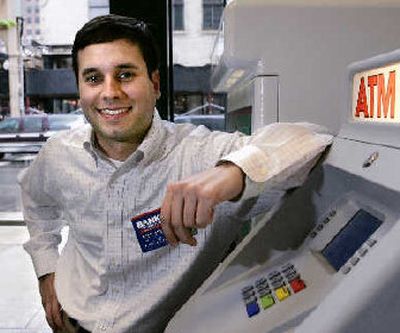Interest grows in virtual banks

NEW YORK — Higher interest rates initially drove Nick Sayers to the Bank of Internet. But he soon realized it’s more convenient, too.
Sayers, 26, a private equity investor in Chicago, is one of a growing number of Americans ditching their neighborhood, bricks-and-mortar accounts. Others are moving the bulk of their money to virtual banks like Bank of Internet, which can offer better rates because they don’t have to operate multiple branches.
To deposit money, customers generally mail checks in postage-paid envelopes, arrange for direct deposits of paychecks or transfer funds from another account using the Internet or telephone. To withdraw money, they can go to any ATM — some banks, including Bank of Internet, will refund most fees another bank charges.
For Sayers, that means he can drop off checks in any mailbox and use any ATM without fees.
“I hate paying the two bucks when I take out money,” he said.
Virtual banks have grown steadily over the past decade, though only about 2 percent of all U.S. deposits are in such accounts, according to Jim Bruene, editor of the Online Banking Report industry newsletter.
But virtual banks are expected to get more serious consideration as interest rates rise in general, Bruene said, making it worthwhile to shop around for the best deals. Even bricks-and-mortar banks like Citigroup Inc.’s Citibank and HSBC Holdings PLC have set up their own online offerings.
According to the Pew Internet and American Life Project, 43 percent of Internet users have banked online, generally through their bricks-and-mortar accounts, compared with 17 percent in 2000.
“A lot of consumer behavior has changed in the last seven years,” said Catherine Palmieri, managing director of Citibank.com.
The bank started Citibank Direct in March; customers must use the Internet to open an e-savings account, but can still visit Citibank tellers. The new offering follows Citibank’s Citi f/i, a virtual bank that closed just a year after launching in 1999.
As more employers promote direct deposits and more merchants accept plastic for payments, some customers have little need for checks and cash, giving them more reason to sever ties with their local branch.
David Schandler, 41, a real estate consultant in Reston, Va., uses the Internet to move money around three virtual accounts — at Presidential Bank FSB, ING Direct and HSBCdirect.com — depending on which offers the best deal.
ING Direct, so far, has been the most successful of the virtual banks, drawing nearly 4 million customers since opening in 2000.
Although it is part of the Dutch banking and insurance company ING Groep NV, ING Direct only has four “cafes” in the United States. Customers can learn about accounts and drop off deposits, but those get sent to a processing center in St. Cloud, Minn.
Going online gives banks the ability to operate nationwide without having to open branches across the country.
Although VirtualBank — whose slogan is “Building Wealth. Not Branches” — has to staff a service center, it doesn’t have to “overstaff at branches” just to have tellers waiting around for a rush, said Grace Dahl, a senior vice president.
Bruce Cleveland, chief executive of Presidential Bank FSB, said the bank gets about half of its customers outside the Washington, D.C., area, where it has nine branches.
“We don’t have to add branches to grow,” he said.
Likewise, HSBC launched its virtual offering in November to expand beyond its current base of New York and a handful of other states, spokesman Stephen Cohen said. Unlike Citibank’s offering, HSBCdirect’s customers may not use a teller.
Virtual banking isn’t for everyone.
“Only so many people have balances large enough to make this worthwhile,” Bruene said.
Lower-income families who live from paycheck to paycheck may find mail and other delays untenable, said Frank Trotter, president of EverBank Financial Corp.’s EverBank Direct.
Anyone needing to drop off coins, exchange bills or rent a safe deposit box won’t find virtual banks appealing, either.